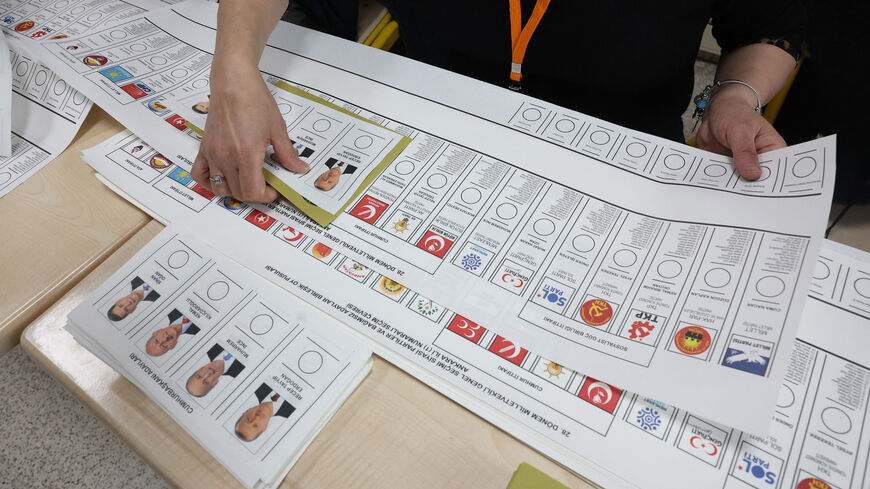Much to the surprise of most polling institutions and the stock market, incumbent President Recep Tayyip Erdogan took the lead in the results of the May 14 elections in Turkey. He finished roughly 5% ahead of his main contender, Kemal Kilicdaroglu, in the presidential vote, and his ruling coalition secured 322 of the 600 parliament seats. It looks like the die is cast for the May 28 runoff, and both the Istanbul Stock Exchange and the Turkish lira have anticipated the final result as both nosedived in mistrust of prolonged “Erdoganomics,” which was probably key to delivering the votes of the Anatolian heartland to the president — though they should translate into a worsening of the financial crisis in Turkey as a whole.
A map of the voting results' regional breakout epitomizes the split between two — actually, three — constituencies, which heavily mobilized voters with an 89% turnout, a figure seldom reached in Western democracies. Erdogan's arch-nationalist and conservative Islamist coalition (the so-called "Turkish-Islamist synthesis”) leads in widely Sunni central Anatolia — including in Maras, which was devastated by the February quakes, where the death toll was amplified by developers bribing local authorities to allow for seismic substandard building. The incumbent got close to 72% of the votes. While the more developed and affluent coastal western and southern regions and the capital city, Ankara, and the majority Kurdish-populated East gave their ballot to the opposition, it was not sufficient to tilt the balance in its favor.
The enduring pro-Erdogan constituency recipe is a blend of identity politics and economics. The Anatolian populace, which had been culturally marginalized during the 70 years of Ataturk’s legacy of 20th-century secularist Europeanization, significantly benefited from governmental measures taken by the ruling AKP to boost pious Muslim entrepreneurship since 2002. It contributed to strong growth in the first of the two decades of Erdogan’s rule, a performance that corresponded to the rise of the Muslim Brotherhood at large in the Middle East at that time and was praised in Washington and Brussels alike as the “Turkish model.”
Though those policies proved unsustainable and generated the present massive inflation and depreciation of the Turkish currency, the incumbent president’s core Anatolian voting block feared they would pay the price for a more orthodox economic doctrine inspired by Western models, and they stuck by his side in spite of the harshness of daily life. On top of that, they strongly identified with his religious-cum-authoritarian governance style rooted in the Ottoman legacy that “makes Turkey great again” and gives it a pivotal role between the European Union and the MENA region as well as Russia and NATO. One of the main attractions in the campaign was the brand-new, first-ever Turkish aircraft carrier, Anadolu (Anatolia), moored in Istanbul, which crowds waited up to five hours in line to visit. That it was built with Spanish plans was not made public.
Conversely, that constituency would not give their ballots to the pluralistic opposition coalition, as they could not trust the blend of secularist, Alevi and Kurdish flavors they saw as sapping the identity construct they stand for. Such a Kulturkampf was epitomized by an AKP Cabinet minister who — on the verge of election day — prophesized that according to the results, opposition voters would sip champagne when Erdogan’s electors would praise Allah and bow toward Mecca on their prayer rugs.
In spite of a prognosis of Erdogan’s victory in the upcoming runoff, the very fact that he could not win in the first round shows that close to half of Turkey’s 60 million voters would put aside their secularist versus religious, nationalist versus Kurdish, Sunni versus Alevi primary affiliation to join in a massive rejection of the incumbent. Whether the coalition as such would survive a defeat on May 28 remains to be seen, but the polarization of civil society along the dividing line of Erdogan’s figure is more entrenched than ever.
Some have questioned the capacity of his contender, Kilicdaroglu, after he advertised in a much-viewed video his Alevi background (he is also partly Kurdish) to reach out to that part of the Anatolian Sunni-Turkish constituency that should have distanced itself from the ruling coalition had the economy been the main driver of the vote — while the cultural identity issue proved resilient. The pluralism card, or the coalition of the minorities program, was at issue — an echo of the 2016 US election pitting Democrats under Hillary Clinton's rainbow coalition against Trump's MAGA, or the rise of rightist populists in the EU, from Scandinavia to Italy, and Ms. Le Pen now heading in the polls for the next French presidential election.
Finally, should Erdogan succeed in the runoff, it would reinforce the anti-Western illiberal block running from Moscow to Beijing via Arab autocracies and through BRICS, the Shanghai Cooperation Organization (SCO) and the Astana Accords, among others. Russia’s meddling in the election campaign was pointed out by Kilicdaroglu, while Putin praised the incumbent who has proved a significant ally in the face of Western sanctions, as Turkey has become the main hub for Moscow to evade them through trade, oligarchs’ travels and money laundering. But the sharply divided Turkey that will be consolidated after May 28 may well become the locus for the fault line between the liberal West and the illiberal East instead of the bridge that the Ankara strongman has heavily publicized during his tenure so far. All the more so if a winning Erdogan capitalizes on the blank check drawn on identity politics and goes on subsidizing his Anatolian electorate instead of fixing the economy — a strategy that might strike back with a vengeance.







